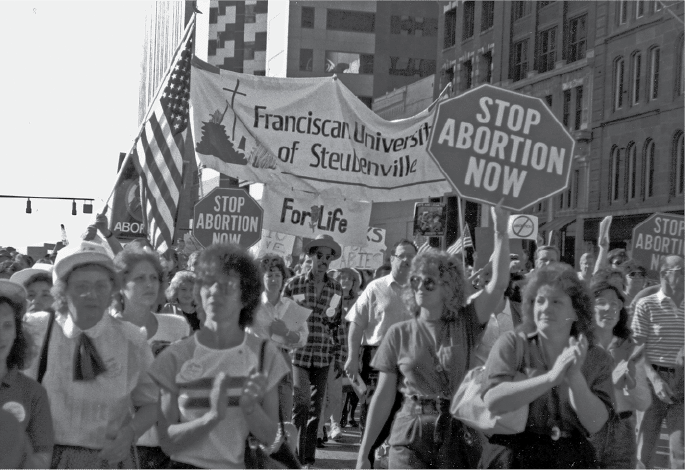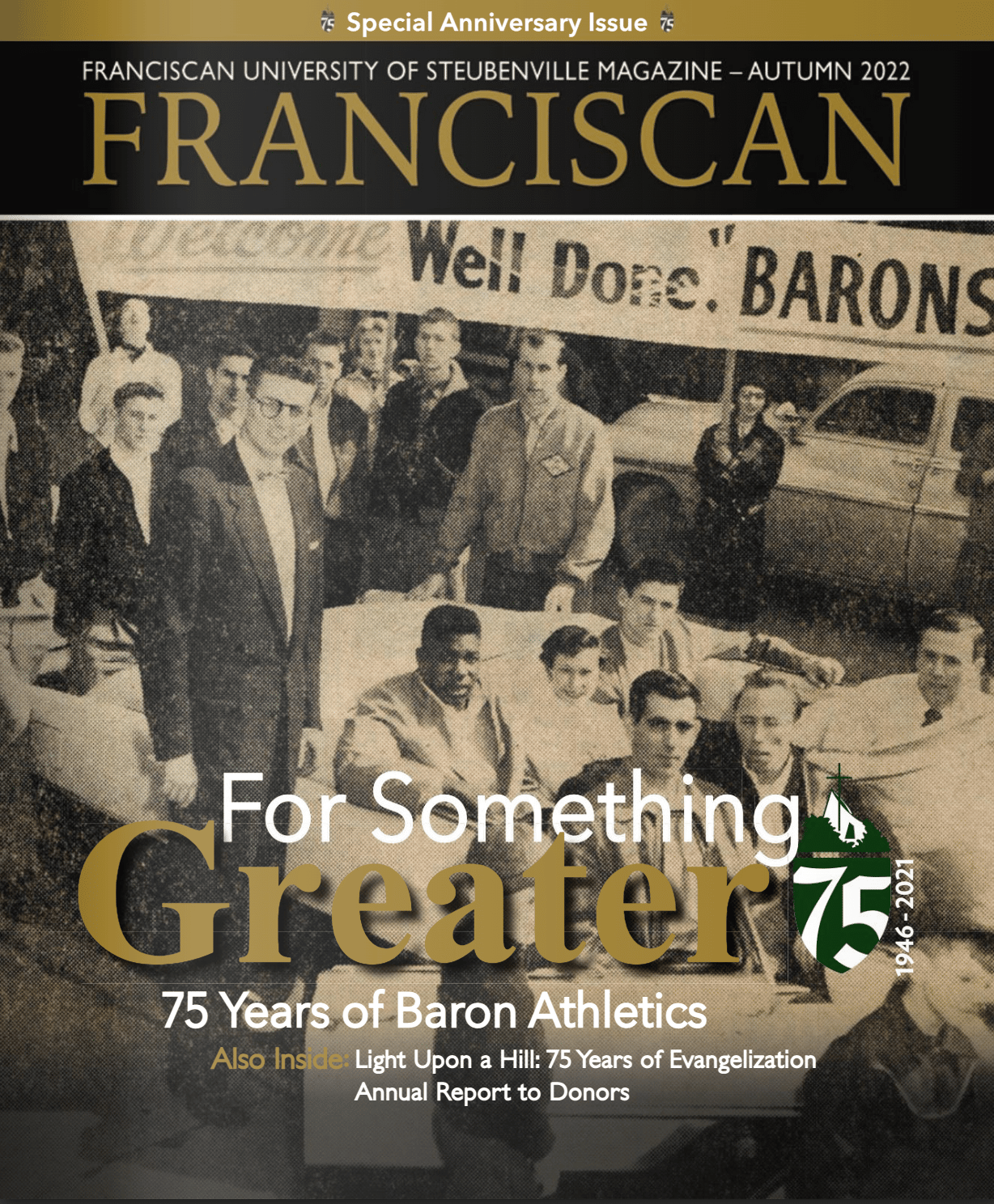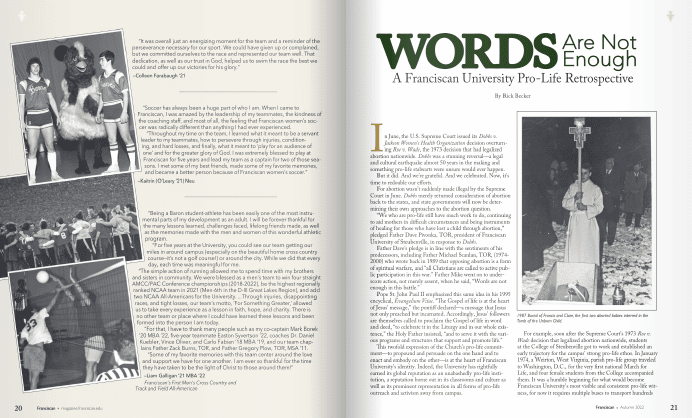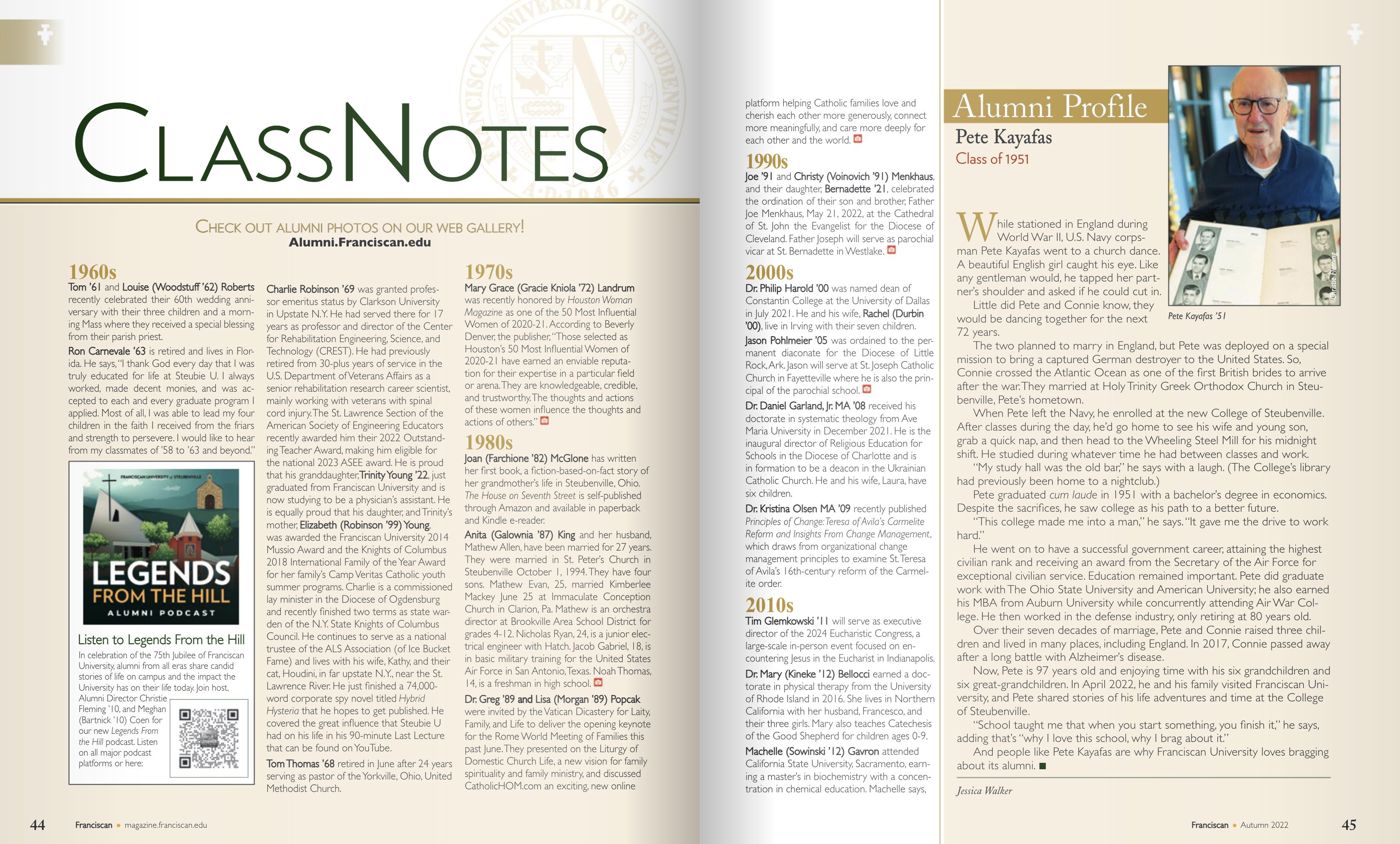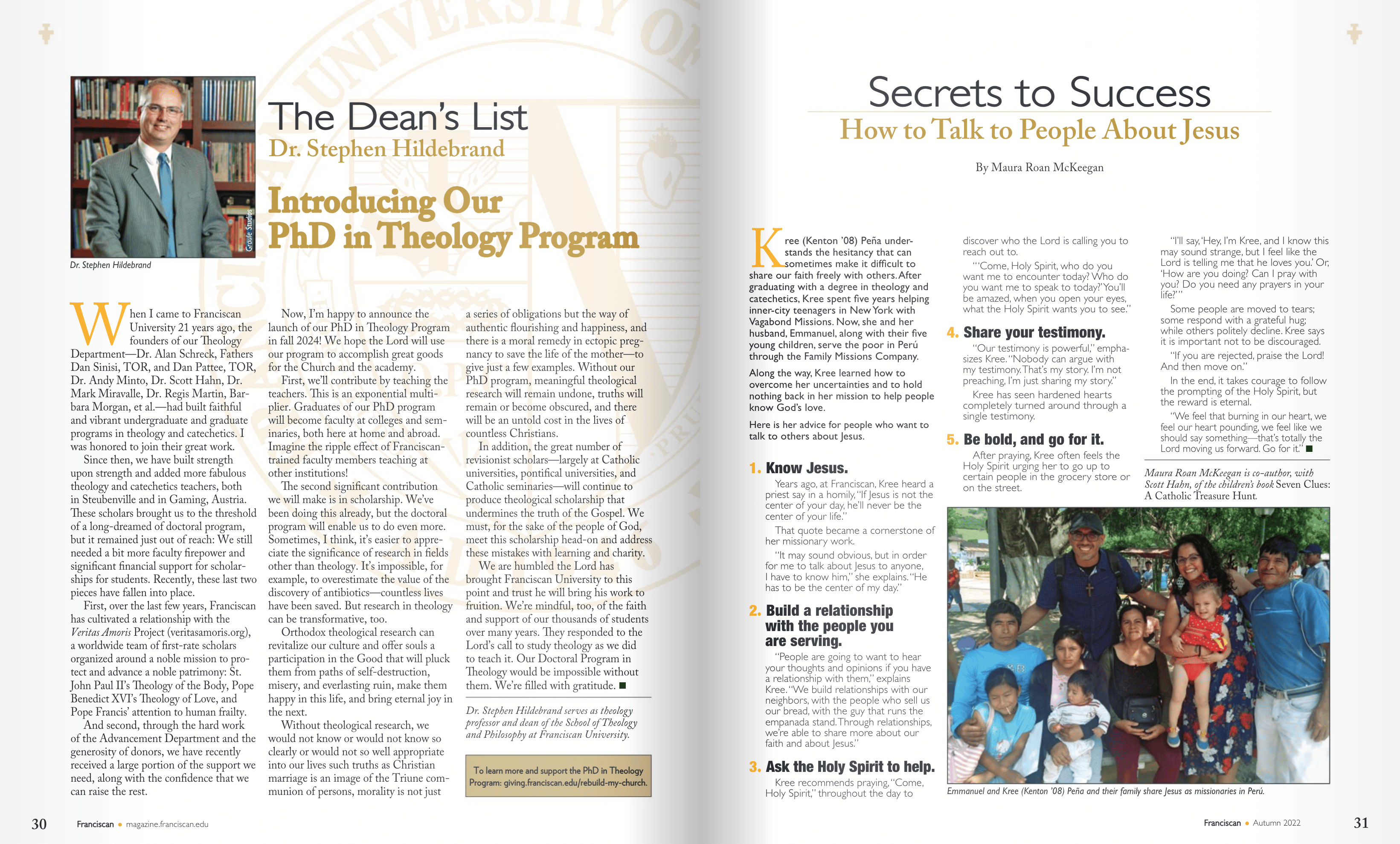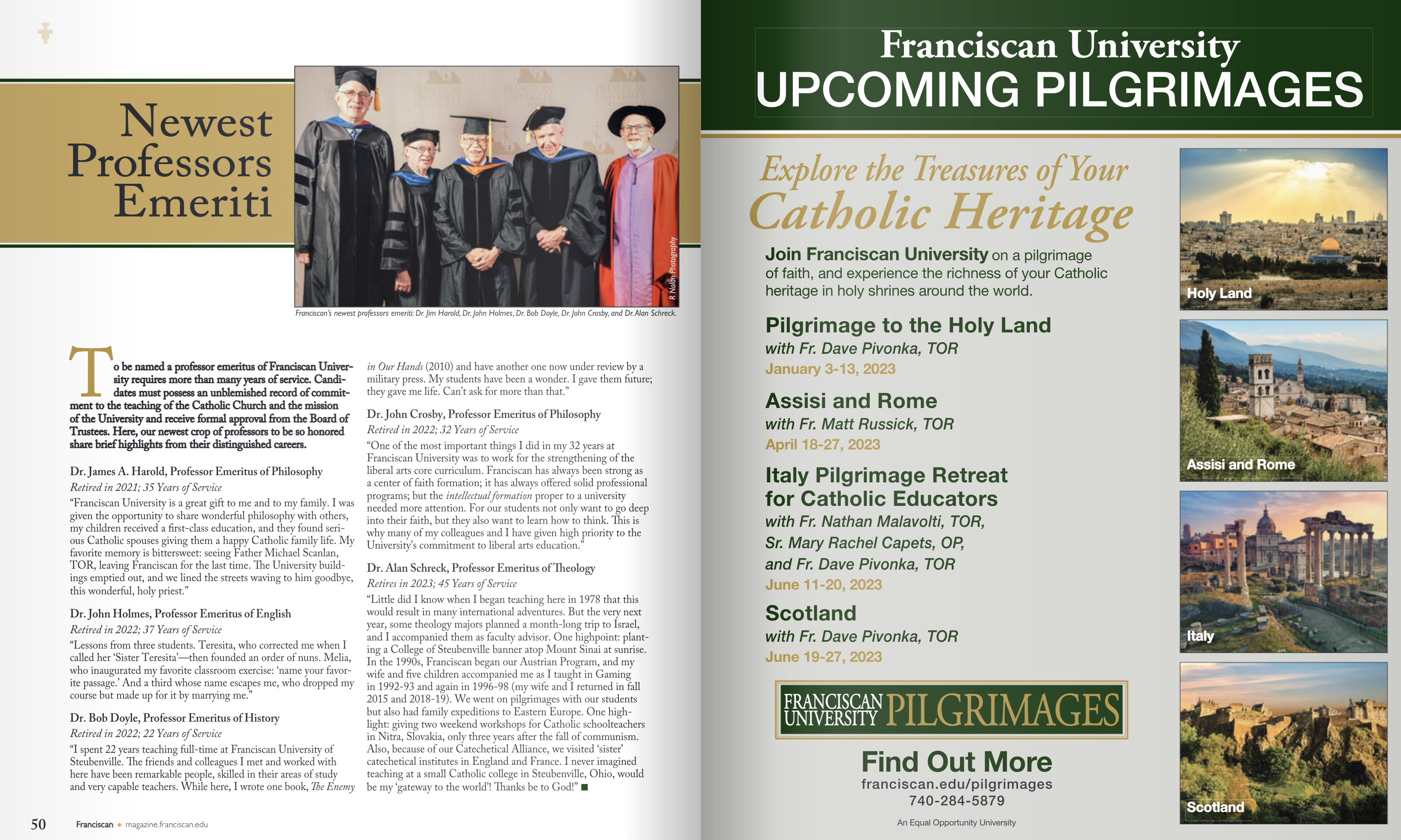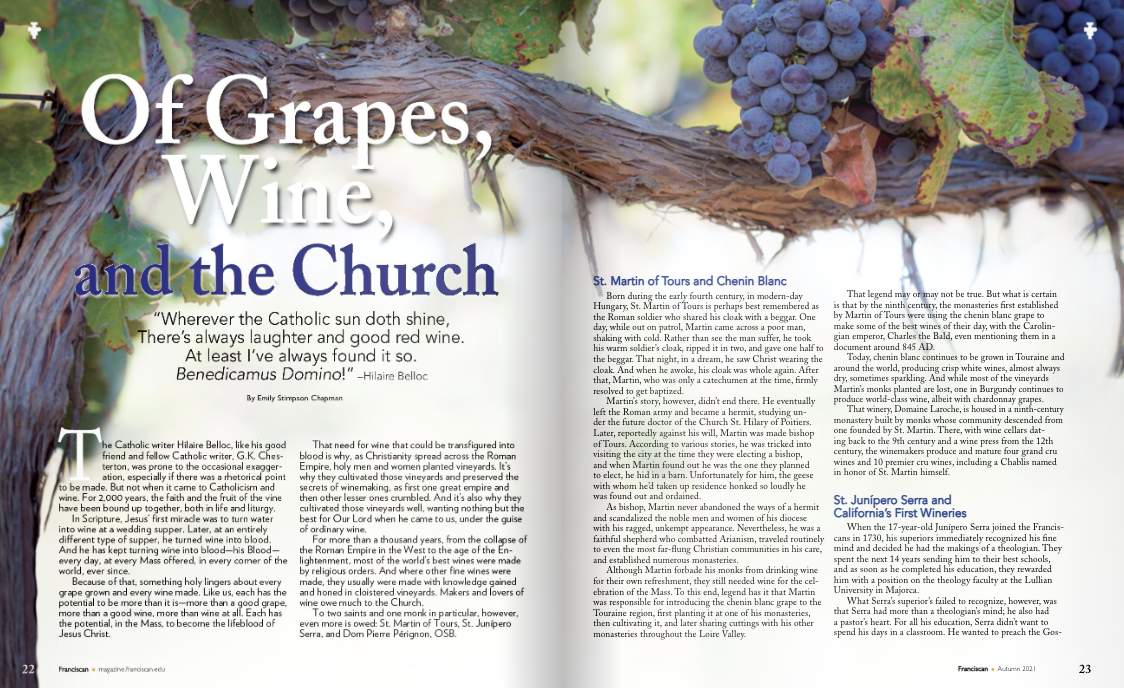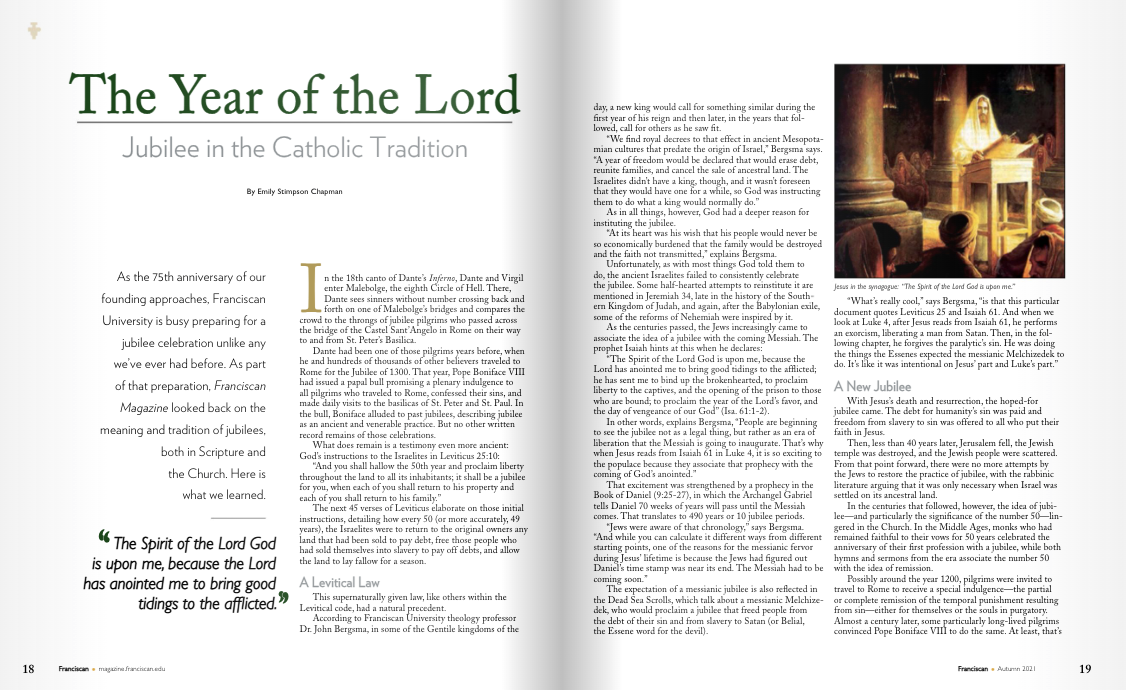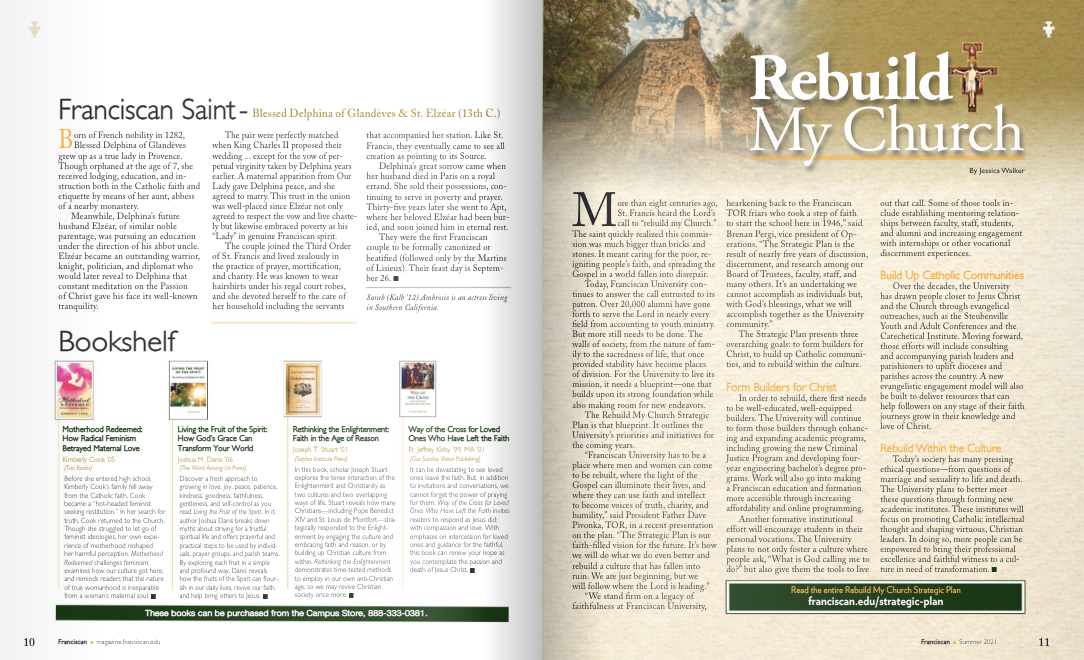In June, the U.S. Supreme Court issued its Dobbs v. Jackson Women’s Health Organization decision overturning Roe v. Wade, the 1973 decision that had legalized abortion nationwide. Dobbs was a stunning reversal—a legal and cultural earthquake almost 50 years in the making and something pro-life stalwarts were unsure would ever happen.
But it did. And we’re grateful. And we celebrated. Now, it’s time to redouble our efforts.
For abortion wasn’t suddenly made illegal by the Supreme Court in June. Dobbs merely returned consideration of abortion back to the states, and state governments will now be determining their own approaches to the abortion question.
“We who are pro-life still have much work to do, continuing to aid mothers in difficult circumstances and being instruments of healing for those who have lost a child through abortion,” pledged Father Dave Pivonka, TOR, president of Franciscan University of Steubenville, in response to Dobbs.
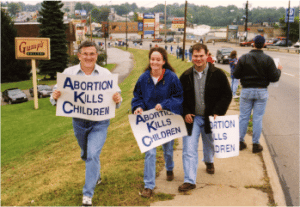
Philip Pergi along with Lisa (Mclnnis ’97) and Brenan ’98, MBA ’02 Pergi at the 1998 Life Chain on Sunset Boulevard in Steubnville.
Father Dave’s pledge is in line with the sentiments of his predecessors, including Father Michael Scanlan, TOR, (1974- 2000) who wrote back in 1989 that opposing abortion is a form of spiritual warfare, and “all Christians are called to active public participation in this war.” Father Mike went on to underscore action, not merely assent, when he said, “Words are not enough in this battle.”
Pope St. John Paul II emphasized this same idea in his 1995 encyclical, Evangelium Vitae. “The Gospel of life is at the heart of Jesus’ message,” the pontiff declared—a message that Jesus not only preached but incarnated. Accordingly, Jesus’ followers are themselves called to proclaim the Gospel of life in word and deed, “to celebrate it in the Liturgy and in our whole existence,” the Holy Father insisted, “and to serve it with the various programs and structures that support and promote life.”
This twofold expression of the Church’s pro-life commitment—to propound and persuade on the one hand and to enact and embody on the other—is at the heart of Franciscan University’s identity. Indeed, the University has rightfully earned its global reputation as an unabashedly pro-life institution, a reputation borne out in its classrooms and culture as well as its prominent representation in all forms of pro-life outreach and activism away from campus.
For example, soon after the Supreme Court’s 1973 Roe v. Wade decision that legalized abortion nationwide, students at the College of Steubenville got to work and established an early trajectory for the campus’ strong pro-life ethos. In January 1974, a Weirton, West Virginia, parish pro-life group traveled to Washington, D.C., for the very first national March for Life, and four female students from the College accompanied them. It was a humble beginning for what would become Franciscan University’s most visible and consistent pro-life witness, for now it requires multiple buses to transport hundreds of students to the nation’s capital each January for the March for Life. Moreover, since 1996, classes have been suspended on the day of the march every year to facilitate as much student participation as possible.
The year 1974 also marked the formation of a campus Right-to-Life Committee early in the fall semester. Steubenville college student Tim Hirten ’75, the group’s organizer, said the non-sectarian club would “promote respect for the worth and dignity of all human life” as well as support the “protection for human life before and after birth”—a clear acknowledgement of the need for combining action with words and to care for both babies and their mothers.
It is noteworthy that 1974 was also the year Father Michael Scanlan, TOR, began his 26-year tenure as president of Franciscan University of Steubenville. Father Michael was extensively and directly involved in the student-led Right-to-Life Committee (now known as Students for Life), and he built on that involvement to further shape the University’s pro-life character.
“To rescue babies being killed, to help women, and to stand for the truth that abortion constitutes the killing of human beings.”
To find evidence of that character, one only needs to peruse the list of pro-life leaders and organizations that have received official commendations from the University over the decades. These include a Founders’ Award to the original members of Ohio Valley Right-to-Life Society (1989) and Poverello Medals to pro-life activists Chris and Joan Andrews Bell (1997) and Steubenville’s AIM Crisis Pregnancy Center (2008). Additionally, Franciscan University has bestowed honorary doctorates on numerous pro-life leaders, including March for Life founder Nellie Gray (1998), Congressman Henry Hyde (2001), Dr. John Haas of the National Catholic Bioethics Center (2002), and Priests for Life National Director Father Frank Pavone (2002).
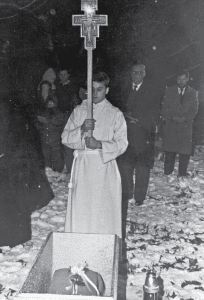
1987 Burial of Francis and Clare, the first two aborted babies interred in the Tomb of the Unborn Child.
Yet the most tangible expression of the University’s fundamental commitment to a culture of life is arguably the Tomb of the Unborn Child located adjacent to the Portiuncula Chapel.
“In 1986, I came up with the idea to build a tomb to remind people of the tragedy of abortion,” wrote the late Mike Marker, co-director of the Human Life Center (Family Living Council) run by him and his wife, Rita, and housed at Franciscan for a number of years beginning in 1986. “After consulting with Father Michael Scanlan, we decided it would be a good idea, and I was given the go ahead to make the arrangements.”
The tomb was built, complete with eternal flame, and the dedication ceremony took place in January 1987 on the 14th anniversary of Roe v. Wade. An ecumenical service preceded the dedication, as well as a procession bearing two aborted fetuses named “Francis” and “Clare” who were temporarily buried in the tomb. The fetal remains were relocated to a local cemetery as a cautionary measure out of fear of vandalism, but they were returned to campus in 1993. Over the years, five additional aborted babies have been interred in the tomb, and it has become a center for inspiration and healing for many.
“It is not uncommon to see people praying before the tomb at all hours of the day and night,” Marker testified, and today, Students for Life leads a weekly Rosary at the site. “There are many stories of how people have been moved to action in pro-life work, moved to forgiveness, moved to a deeper meaning of the value of human life, and, most of all, moved to a greater love of our Creator.”
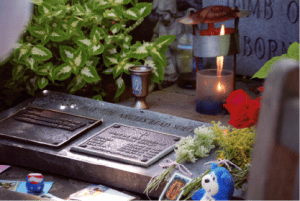
People who were moved to action include those who got involved in the rescue crusade of the late 1980s and early 1990s. Grounded in Catholic social teaching and inspired by the nonviolent resistance philosophy of leaders such as Martin Luther King Jr. and Gandhi, this national movement of pro-life civil disobedience saw thousands of men and women use peaceful means to shut down abortion clinics to save lives.
“When the civil order fails to embody the moral order,” said Franciscan University theology professor Dr. Mark Miravalle in explanation of his 1988 arrest at a Pittsburgh abortion facility, then dramatic activities like rescue “become necessary means of defending human life.”
Although not officially sponsored by the University, many from the campus community—students, faculty, and staff alike—got involved as both “rescuers” willing to be arrested and supporters who engaged in prayer, picketing, and sidewalk counseling.
In 1989, Father Scanlan, Steubenville Bishop Albert Ottenweller, and 45 others were part of a rescue event at a Youngstown, Ohio, abortion clinic. The participants blocked the clinic’s entrance with their bodies and went limp as police dragged them away to jail. When asked why the “Youngstown 47” chose to engage in this illegal activity, Father Scanlan replied, “To rescue babies being killed, to help women, and to stand for the truth that abortion constitutes the killing of human beings.” He also observed that many students were taking up the rescue cause as a direct result of the pro-life formation they received at Franciscan University.
That formation is truly a defining characteristic of the University, and it continues to permeate the campus experience for students, both in class and out. Students for Life, for example, the largest club on campus, holds weekly meetings, brings special speakers to campus (such as Abby Johnson, the former Planned Parenthood director featured in the 2019 film Unplanned, as well as the actress who portrayed her, Ashley Bratcher), and sponsors a variety of activities: a prayer vigil at Pittsburgh’s Allegheny Women’s Center abortion clinic on Saturday mornings, an overnight prayer vigil every Good Friday at Pittsburgh’s Planned Parenthood, a Mass and procession to the Tomb of the Unborn Child in September to mark the National Day of Remembrance for Aborted Children, Life Chain in October, and extensive coordination for the campus community’s annual trek to Washington, D.C., for the March for Life.
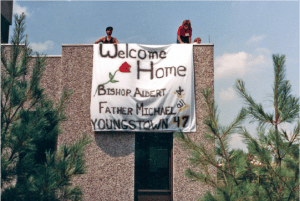
Franciscan University celebrates the return of the “Youngstown 47” after their week in jail following a pro-life demonstration outside aYoungstown, Ohio, abortion clinic.
The group has also engaged in activities and outreach nearer to home.
“In recent years, Students for Life has led a concerted effort to directly support Steubenville’s pregnancy care ministry, the Aim Women’s Center,” says Ron McNamara, coordinator of Student Leadership Development and Students for Life’s advisor. “They help with fundraising and volunteer onsite downtown.”
And now, with the reversal of Roe v. Wade, Students for Life will focus more efforts on fostering life-affirming laws and culture in Ohio—including traveling to the Columbus statehouse in October for a march to promote pro-life legislation in the state.
It’s no surprise that Franciscan University’s pervasive culture of life continues to impact the world via its graduates—through their joyful embrace of family life, their work for pro-life organizations, and their prayer.
“We’re here for the children, here for mothers, and we’ll continue to do what we’ve always been doing–but under more of a spotlight now.”
Moreover, significant numbers of alumni choose to devote their lives to pro-life work. Erin (Wilson ’11) Shircliff, for example, moved to Chicago and started a family before returning to her hometown of Fredericksburg, Virginia, and joining in the work of Mary’s Shelter, a charitable community for women facing crisis pregnancies. Shircliff’s mother, Kathleen Wilson, launched the shelter in a small apartment in 2006, and it has steadily expanded in size and scope through the years.
“I started as a volunteer, but it turned into a job, and now I’m the intake coordinator,” says Shircliff.
Shircliff was already pro-life before arriving at Franciscan University—a destination she was 100 percent sure about: “It was the only college I applied to.” When she wasn’t studying for her theology major, Shircliff took full advantage of all the life-affirming activities on and off campus.
“I loved being a part of it,” she recalls. “It’s such a great place to be with like-minded people.”
Regarding what lies ahead in the wake of the Dobbs decision, Shircliff reiterates the emphasis on action that was instilled in her at Franciscan University.
“We’re here for the children, here for the mothers, and we’ll continue to do what we’ve always been doing—but under more of a spotlight now,” she said. “With Roe gone, people will be relying less on abortion to solve problems, so we need to step up and provide support.”
Rick Becker ‘MA ’96 writes from Indiana.



